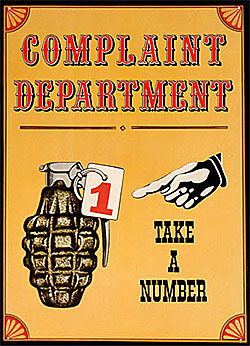Complaint Department Is Ready To Hear You!

If they aren’t complaining about others, they do about themselves: “Why do I keep saying ‘yes’ when I already have plenty to do?” I’m such a wimp. I just shut down when it even looks like an argument’s brewing.”
If it’s not people, then it’s the system or the economy or something doing something to them. “Do you believe it? The bridge took my bumper out!”
I don’t mind complaints. I do mind hearing the same one over and over and over again. I mind because I don’t like people to think they are victims. Luckily, many years ago, a colleague introduced me to three types of complaints that ended my days as a victim and began my reign as a champion complainer. Here’s what I learned.
Recreational complaint: With this kind, there’s no intention to change or solve anything. There’s no request. My father-in-law in AZ complains about the weather: “It’s always blue skies. Our weather is boring!” My friend in Oregon complains: It’s another dreary day in Portland. I guess I’ll get my umbrella and take a walk.” No one takes these seriously. They can be annoying, but there’s little harm in them. They are more a conversation starter, more akin to social grease.
Expressive complaint: Like the recreational complaint, there’s no intention to change or solve anything. There’s no request. “I can’t believe the new leader. He didn’t even send our department an invitation to the all staff meeting. He told our manager we were probably too busy because it was tax time.”
There’s danger in this kind of a complaint. If this is as far as the conversation goes, it leaves both parties discouraged and in a mood of being a victim. It sucks the life out of the relationship and possibility.
Committed complaint: Unlike the previous two types, this one includes a request for a change. “I am sending a request by Friday to the CEO that no department is left out of any staff meetings.” No victims here.
By the way, if you’d like to move an expressive complaint to a committed complaint, ask the complainer, “Do you have a request?” If they look at you funny, congratulations! You’ve interrupted the drift of the status quo. As a bonus, you may have been removed from the list of people to whom they complain. Hey, I just saved you 3 hours a week of energy-sucking time!
Complain committedly. Make a request, listen for the response, (accept, decline or counteroffer). Do this and you’ll stop being a victim and start complaining like the champion I know you can be.
•••
Camille Smith Leadership Coach, Communication Specialist, Facilitator, Speaker, President, Work In Progress: www.wipcoaching.com Office: 831-685-1480